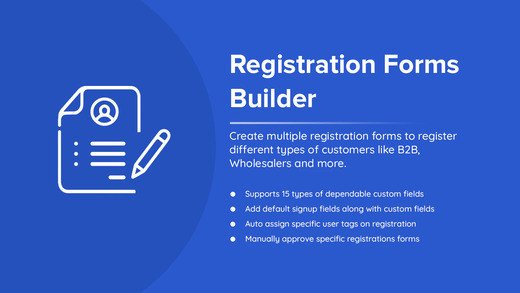
Success hinges on delivering personalized, efficient, and seamless experiences to your customers. One powerful yet often overlooked tool for achieving this on Shopify is the use of custom form fields. Whether you're running a B2B store or a DTC brand, apps like the B2B Registration Forms Builder help you unlock the full potential of custom data collection and customer segmentation. This guide explores how to master Shopify custom form fields to improve operations, customer engagement, and conversions.
Custom form fields are additional input options you can add to your store’s forms—such as registration, contact, product, or checkout forms. These fields can include text inputs, dropdowns, checkboxes, file uploads, date pickers, and more. They allow merchants to collect tailored information from customers that Shopify’s default forms don't support.
For example, a wholesale merchant may need to collect tax IDs or business license documents during account registration. A custom apparel store may want customers to upload a logo or type in personalization details on a product page. These custom fields turn generic forms into powerful data tools.
Shopify doesn’t offer much flexibility with native forms. That’s where apps like B2B Registration Forms Builder come in. This app allows you to:
Create custom registration forms
Add conditional logic to fields
Enable account approval workflows
Store and manage customer-submitted data
Assign customer tags based on form responses
With this app, you can design complex form flows without needing to code, making it an ideal solution for merchants of all technical levels.
For wholesale or B2B businesses, the registration process is often more complex. You may need to verify business credentials, assign pricing tiers, or approve users before they gain access to your store. With custom form fields, you can collect all required data upfront and streamline the onboarding process.
Let customers personalize products with names, images, or messages using file upload and text input fields. This is ideal for apparel, gifts, print-on-demand products, and more. The data collected through custom fields is stored with the order, ensuring accurate fulfillment.
Use custom fields to gather additional booking details like preferred time slots, guest count, or special requests. This allows you to tailor your service or follow-up communication efficiently.
Keep it concise: Don’t overwhelm users with too many fields. Ask only for what’s necessary.
Use conditional logic: Show or hide fields based on earlier responses to streamline the experience.
Test your forms: Before going live, test every form on desktop and mobile to ensure it works properly.
Integrate with CRM or email: Use tags and data to segment customers for marketing automation and better service.
Shopify custom form fields can transform how you collect, manage, and act on customer data. With apps like B2B Registration Forms Builder, creating powerful forms becomes easy—even without any coding. Whether you’re personalizing the shopping experience, managing B2B customer approvals, or capturing detailed product specifications, mastering form fields will set your store apart. Start leveraging this tool today and turn forms into one of your most valuable assets.